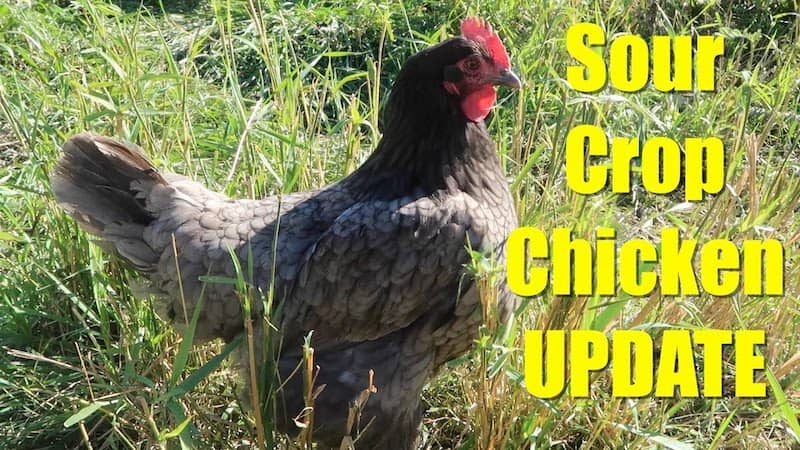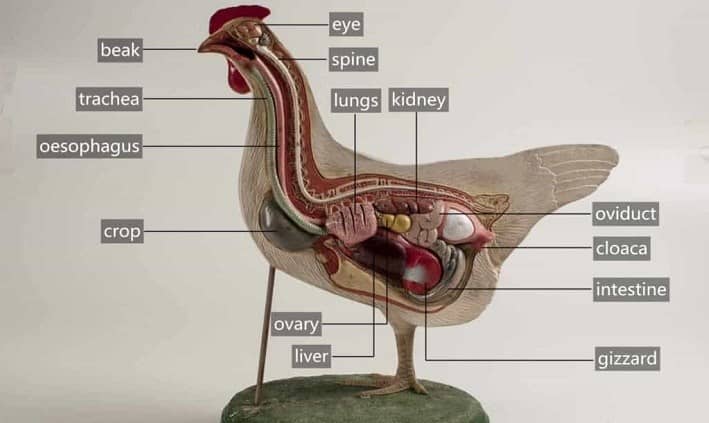The crop is a small bag or pouch located just above the stomach of chickens. It is meant to store food temporarily before it goes down to the stomach. Sour crops in chicken develop when the crop empties slowly or entirely fails to empty. Food stuck in the crop usually starts to breakdown or ferment, thereby causing the chicken to be ill. The problem can be severe, and it can lead to other diseases that might eventually lead to death.

Since this is a dangerous condition, there is a need for chicken owners to always check their flocks for cases of a sour crop. Get information on the symptoms of the condition and learn how to treat it immediately before developing other diseases. In this article, we shall discuss more the chicken sour crop, symptoms, causes, and largely how to treat and prevent it.
The Causes Of The Sour Crop In Chicken

A sour crop is not a common health condition at large. However, since it is dangerous, it is good for people domesticating chicken to have an idea about its cause, prevention, and ways to treat it. This shall help chicken keepers to provide their flock immediate treatment to prevent their chicken from developing other diseases. Below are a few causes of the sour crop to learn;
Improper Feeding
This is one of the top causes of a sour crop. The condition arises from the extreme temperatures of the food chicken are fed and improper consistency of the kinds of foods they consume. The problem might also arise due to climatic conditions the chickens are subjected to.
Bacterial Infection
Bad food intake might also cause a sour crop at large. The food causes bacterial infections in the intestinal tracks thereby leading to development of a sour crop.
Metabolic Diseases
Chickens develop different health problems throughout their lifetime. Diseases like pancreatitis and liver malfunction are common in most hens, and they can cause sour crops.
Fungal Infection
The kind of food we give our chickens matters a lot. You might feed your chicken feeds infected by fungus and thereby leading to a sour crop.
Viral Diseases
Some viral conditions like the proven tricular dilatation are common to chickens at large. Such a disease can lead chickens to develop a sour crop.
Obstruction
This is also another common cause of a sour crop. The problem develops after ingesting a foreign material or any food material having foreign objects in it.
Having looked at the causes of this deadly condition, we should learn its symptoms, the prevention measures, and how to treat it at large. Read on to get idea more about it.
Sour Crop Symptoms
Learning about the symptoms of a sour crop can be of great importance to chicken keepers who need to learn how to go about the disease. This will help improve your chicken’s well-being and prevent it from causing other illnesses that can eventually lead to death. Below are the common signs and symptoms of a sour crop.
- Diarrhea and vomiting
- Less active; Chickens stops to respond to any sound, and they are also get less interested in food.
- Low appetite; your chicken might lack the appetite to eat anything or also even avoid eating at all.
- Over distention of the crop
- Lethargy; this is a condition of showing that the chicken is weak. You will find it asleep all times, their feathers always ruffled and the head under the wings.
If you notice such symptoms, then your chicken possibly has developed a sour crop. You need to immediately call a vet to treat it before it develops conditions that might be deadly.
Checking For Sour Crop Problems In Chickens
When the chicken crop is empty or almost empty, hunger signals are sent to the brain to enable the chicken to eat more. The beak of the chicken secretes amylase, a digestive enzyme that allows little digestion to occur before it is pushed to the remaining digestive tract.
Chicken owners should inspect their flocks regularly to see if there are cases of problems with the crop. This will help to administer the chicken into a treatment plan before the problem develops big. Inspecting your chicken for possible crop problems should be a habit to ensure its well-being is maintained.
It is recommended to carry crop inspections once a week. Hold it gently and look at its chest. Look for cases of a swollen crop or the one that looks a bit bigger than usual. Lethargic and cases of a gradual and sudden loss of weight are all the signs of a sour crop. The chicken will also start making the head’s strange movements during this time, getting it back and forth. All this will be caused by the discomfort of the crop at large.
Inspections should be conducted in the morning. This is the time their crops will be empty after a long night without food. At the same time, this is when picking up a hen since it will still be on its perch.
Carefully pick the chicken and tuck it firmly with its feet and arms secured under one arm. Rub it gently down the chest with your hands to locate the crop. Since it is early in the morning, and the chicken won’t have fed on any feed, the crop should be empty and swollen. If you feel some liquidation sensations in the crop or hardness, there might be a problem with it. A squishy crop is also the beginning of the development of a sour crop. You can also determine this by foul smells that might emanate from the chicken beak.
At times you might find the crop is full, but the beak doesn’t emanate foul smells. The chicken might be either crop bound or has already an impacted crop. When the situation is in the mild stages, the crop contents might be softened before it empties.
Since this condition might lead to other deadly diseases, there is a need for immediate treatment. This will prevent the hen also from starving. Once you suspect your chicken has developed this problem, rush it to the vet to seek medical attention.
Treating A Sour Crop
Whenever you notice any of the above signs of a sour crop, it is advisable to look for a vet to provide the chicken with immediate medication. The food in the crop will spoil the longer it stays there and eventually affect your chicken’s health at large. Intake of food and water is essential for your chicken. In the event of a sour crop, your chicken might suffer from dehydration and also starve of hunger. After the crop empties, ensure you provide your chicken with sufficient food and clean water to regain its usual condition.
The following are the best ways to handle the problem if it develops;
- Feed your chicken with diluted formula
- Resort to feed your chicken with mineral oil
- Provide the chicken warm saline solution
This should be the beginning stage to solve this problem. After feeding your chicken with the feeds above, provide it a light massage at the crop. If the solutions don’t provide a solution, you remain with two resolutions. They include;
Consider manual emptying or flushing of the food orally through a tube. This should be the last resort in solving this problem since it doesn’t guarantee your chicken’s survival. A professional vet should perform manual flushing of the crop.
Doing an operation can be another alternative, but it is done depending on your chicken’s size and age. A professional vet should be done who cuts up the crop, empties it, and sews it back.
Prevention Measures
It is always recommended to consider preventing issues from happening other than getting solutions once they occur. Like any other health condition, sour crops can be prevented from happening at large. There are several ways you can control the growth of sour crop at large. One of the prevention measures is restricting your flock from accessing areas with newly-mown grass. This is especially when they are left to free-range out in the morning when they are hungry.
Other preventive measures include;
- Always ensure the chicken are fed with fresh and quality food materials
- Provide your chicken with probiotics regularly
- Give them plenty of gravel and grit
Always make these preventive measures a habit other than waiting for such a condition to hit your flock. It is a deadly condition that needs immediate consideration before it leads to other diseases that might lead to eventual death.
Conclusion
Sour crop is a deadly condition more prevalent to chicks at large. The chicks don’t always feed readily, and at times they might not be aware of the food materials they consume and its quality at large. Even if this condition is more prevalent to chicks, older chickens can also get affected. Chicken keepers should always keep a gold eye on their flocks for any changes that might happen to them. Look at their lifestyle, health in general, and their eating habits. If you note any change in their practices, take immediate consideration to identify the reason behind it. Treat a sour crop early to prevent your chicken from developing other conditions that might lead to eventual death.
